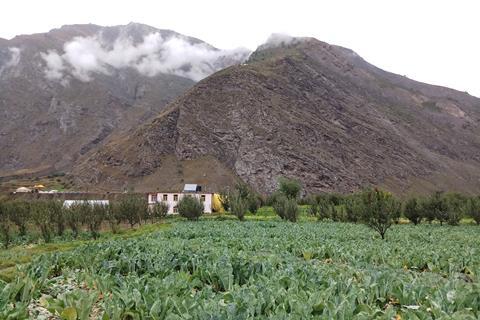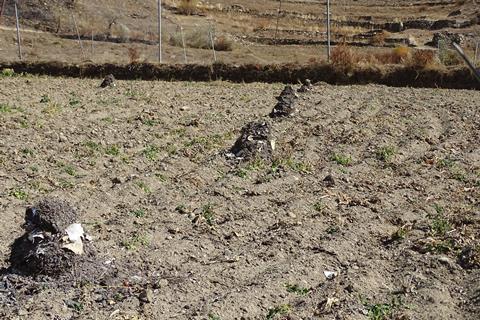Researchers have isolated a consortium of bacterial strains from night-soil compost in a Himalayan valley that support plant growth in wheat and maize, offering promise as a bioinoculant for sustainable agriculture in cold semiarid conditions.

The study’s corresponding author Dr Rakshak Kumar, who is a member of Applied Microbiology International, said the discovery represents a groundbreaking discovery in microbial research, highlighting the development of a psychrotrophic (cold-loving), drought-tolerant bacterial consortium that has the potential to significantly improve crop productivity in the cold, semiarid regions of the Indian Himalayan Region (IHR).
The team from CSIR-Institute of Himalayan Bioresource Technology and Tripura University in India, outlined their discovery in a new paper published in the journal Microbiological Research.
Night-soil compost
The study focused on isolating and characterizing beneficial bacterial strains from the night-soil compost of Lahaul Valley. These strains exhibited vital plant growth-promoting (PGP) traits and were tested for their efficacy in enhancing the growth of wheat and maize under harsh environmental conditions, demonstrating the consortium’s promise as a bioinoculant for sustainable agriculture in challenging climates.
READ MORE: PGPR strain from farmland in India boosts crops in chilly conditions
READ MORE: PGPR Strategies for Climate-Resilient Agriculture
“The paper addresses the real-world problem of declining agricultural productivity in cold, semiarid regions, particularly in the Indian Himalayan Region (IHR). The decline in agriculture in this high-altitude, fragile ecosystem is intensified by factors such as extreme cold, drought conditions, and nutrient-poor soils,” Dr Kumar said.
“The Indian Himalayan Region (IHR) is characterized by cold, semiarid conditions, with frequent snowfalls, low temperatures, and limited water availability. These factors lead to nutrient leaching, soil erosion, and drought stress, all of which severely limit crop productivity.
Climate variability
“Agriculture in the IHR is predominantly rainfed, making it highly vulnerable to climate variability. The scarcity of water, coupled with poor soil fertility, results in lower crop yields, especially for staple crops like wheat and maize. This not only threatens food security but also undermines the livelihoods of the local farming communities.”
Dr Kumar said the use of chemical fertilizers, while offering a temporary boost in crop yields, has led to soil degradation and environmental pollution, and the fragile ecosystems of the Himalayas are particularly sensitive to these impacts, leading to a pressing need for sustainable agricultural practices.
“There is an increasing demand for eco-friendly alternatives to chemical fertilizers that can enhance crop productivity while preserving the environment. Beneficial microorganisms, particularly plant growth-promoting bacteria (PGPB), offer a promising solution by improving nutrient availability, promoting plant growth, and enhancing stress tolerance in crops.

”The research involved isolating and characterizing psychrotrophic bacteria from night-soil compost in the Lahaul Valley, a cold, semiarid region of the Indian Himalayas. The aim was to identify bacterial strains that could promote plant growth and tolerate drought conditions, which are common challenges in this region.”
Growth-promoting traits
The researchers screened 57 bacterial strains for key plant growth-promoting (PGP) traits, such as phosphate and potassium solubilization, nitrogen fixation, and the production of growth hormones and siderophores (iron-chelating compounds). The most promising strains were then combined into a bacterial consortium and tested on wheat and maize plants under controlled drought conditions to assess their effectiveness in enhancing crop growth.
The study discovered that the selected bacterial consortium significantly improved the growth and biomass of wheat and maize plants under drought conditions. One particular strain, Pseudomonas protegens LPH60, demonstrated strong biocontrol activity against common plant pathogens and possessed multiple PGP traits, making it a key component of the consortium.
The research highlights the potential of using this bacterial consortium as a bioinoculant to improve crop productivity in cold, drought-prone regions, offering a sustainable alternative to chemical fertilizers.
Unconventional source
“What makes this study particularly rare is its focus on psychrotrophic bacteria isolated from an unconventional source — night-soil compost from the Lahaul Valley. This type of compost is rich in organic matter and microorganisms but is rarely explored for such applications,” Dr Kumar said. “The discovery that these bacteria not only thrive in extreme cold but also possess robust plant growth-promoting traits and drought tolerance is unusual and groundbreaking.
“Additionally, the study’s integration of physiological screening with genomic analysis to unravel the molecular mechanisms behind these traits is quite novel. The identification of genes related to cold adaptation, phosphate solubilization, nitrogen fixation, and biocontrol in these bacteria underscores their potential as bioinoculants for sustainable agriculture in extreme environments. The comprehensive approach, combining field relevance with cutting-edge genomic insights, represents a significant advancement in the field of microbial biotechnology, particularly for regions facing the dual challenges of cold and drought.”
Resilient agriculture
The use of naturally occurring, drought-tolerant, and cold-adapted bacteria not only enhances plant growth but also reduces the dependence on external inputs, making agriculture more resilient to the impacts of extreme weather, Dr Kumar said.
“This approach has the potential to improve food security and livelihoods in mountain communities, supporting the transition to more sustainable farming practices in vulnerable ecosystems,” he said.Dr Kumar advised that in order to validate the effectiveness of the developed bacterial consortium, extensive field trials should be conducted across various hill regions with different climatic conditions. This will help determine the adaptability and performance of the consortium in diverse environments and identify any region-specific modifications needed to optimize its efficacy.
“Future studies should focus on monitoring the long-term effects of the bacterial consortium on soil health. This includes assessing changes in soil microbiome composition, nutrient cycling, and organic matter content over multiple growing seasons,” he said.
“Understanding the long-term impact will ensure that the bioinoculant contributes to sustainable soil fertility and ecosystem stability.
Traditional farming practices
“Research should explore how the bacterial consortium can be integrated with traditional farming practices in hill regions. This includes studying its compatibility with local crop varieties, traditional composting methods, and organic farming techniques. Engaging with local farmers to co-develop best practices for applying the consortium can enhance adoption and ensure that it complements existing agricultural systems.
“Building on the success of this study, future research could focus on developing tailored bioinoculants for specific crops or regions within the Himalayas. By isolating and characterizing additional psychrotrophic and drought-tolerant strains from various organic sources, researchers can create more targeted solutions that address the unique challenges of different hill farming communities.
“Further research should aim to identify and develop bacterial strains that can tolerate multiple environmental stresses, such as salinity, heavy metals, and acidic soils, in addition to cold and drought. These multi-stress tolerant strains could provide broader protection to crops and be particularly useful in areas facing multiple agricultural challenges.“Collaborations with governmental and non-governmental organizations to develop policy frameworks that support the use of bioinoculants in hill agriculture should be a priority.
Farmer outreach
“Additionally, farmer outreach programs, including training and demonstration projects, are crucial for educating farmers about the benefits and application methods of these sustainable agricultural practices. By focusing on these areas, future research can build on the findings of this publication, further promoting sustainable hill agriculture and enhancing the resilience of farming communities in the Indian Himalayas.”
The study was led by a team of researchers from the CSIR-Institute of Himalayan Bioresource Technology in Palampur, Himachal Pradesh, The team included key contributors such as Shruti Sinai Borker, Pallavi Sharma, Aman Thakur, Aman Kumar, and Anil Kumar. Rakshak, the corresponding author, is affiliated with both institutions, and has recently transferred to Department of Molecular Biology & Bioinformatics at Tripura University.
Topics
- Agriculture
- Aman Kumar
- Aman Thakur
- Anil Kumar
- Applied Microbiology International
- Asia & Oceania
- Bacteria
- Community
- CSIR-Institute of Himalayan Bioresource Technology
- Food Security
- Healthy Land
- Lahaul Valley
- night-soil compost
- Pallavi Sharma
- plant growth promoting bacteria
- Pseudomonas protegens LPH60
- psychrotrophic bacteria
- Rakshak Kumar
- Research News
- semiarid
- Shruti Sinai Borker
- Soil & Plant Science
- Sustainable Microbiology
- Tripura University







No comments yet